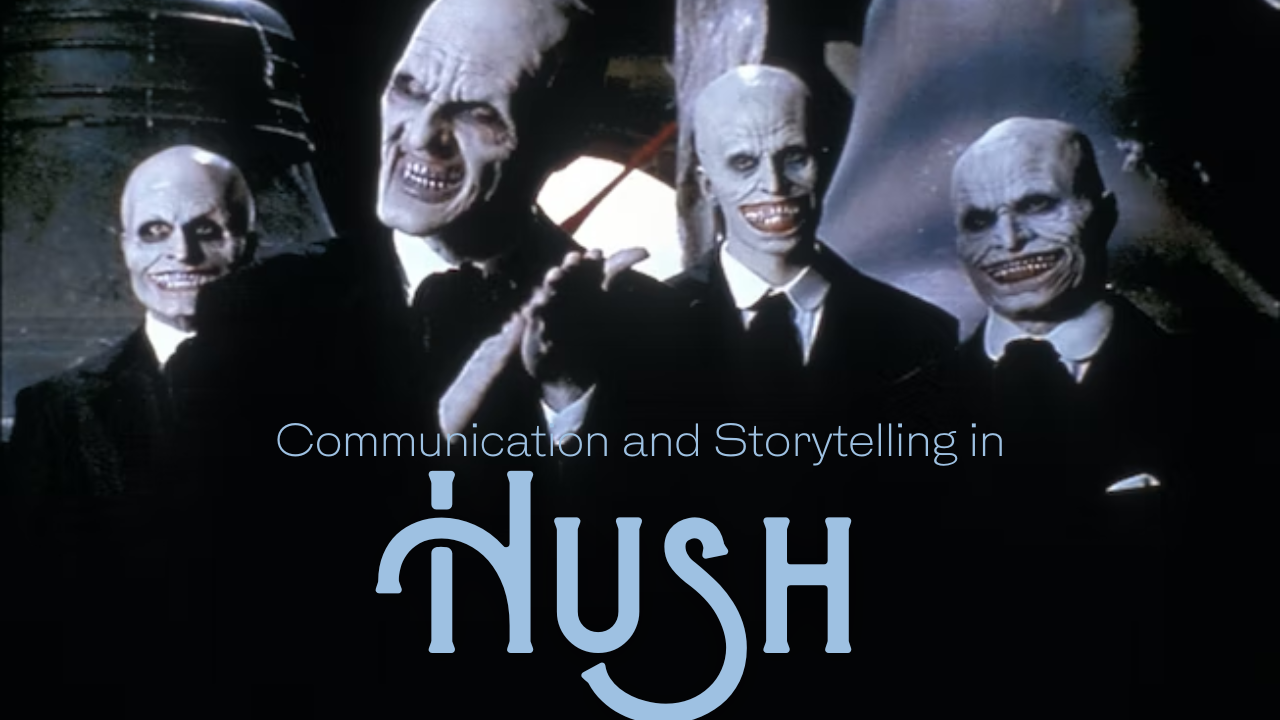
Incidental Mythology
Mythology has never faded away. It has always been a part of us, lingering in our stories as we continued to tell them throughout time. Our current stories, the popular culture around, are our mythology. Its not mythology through some machinations of corporate capitalists who only want more money from our interest. They’re myths because they just are, incidentally.
At Incidental Mythology we explore our contemporary meaningful stories, and really dig down into what these narratives mean to us and why we care so much to tell them, play them, and watch them. At Incidental Mythology, we explain our contemporary mythology, legends and folklore, all in the world of entertainment, and through it learn a lot more about ourselves.

Adaptability in the Unknown | Over the Garden Wall
Over the Garden Wall was initially released in 2014, but has a wonderful timeless feel to it that has made it an autumnal favourite. The show was spawned so many theories and questions about the structure of the narrative. In this essay, I'm exploring the role of the Unknown and the ever present question of the purpose of the journey the brothers are on. The Unknown is a place of required adaptability and necessary constant change, and when an individual becomes too overwhelmed and find it too difficult to go on, they fall into the Hopeless stage that allows the Beast to take them.

Communication and Storytelling in Buffy’s Hush
Originally aired in 1999, Buffy the Vampire Slayer's episode Hush introduced the audience to perhaps the scariest monster in the Buffy series: the Gentlemen. Their silence, creepy smiles, and methodical removal of their victims' voices make them a monster that still haunts fans of Buffy. In this essay, I explore the episode of Hush, and the themes of silence and communication as a form of storytelling. From a myth studies perspective, Hush gives us interesting examples of how language and language disruption can change a community, as well as how the body can also form as an important anchor of communication.

Orville Peck’s Mask and the Myth of the Gay Cowboy
Orville Peck is a South-African born, Canadian-based, and openly gay country musician. His voice, song writing and style all paint an image of a new kind of cowboy mythology: the myth of the gay cowboy. By transforming a typically white-hetero-based mythology, Orville Peck actively transforms the mythology of the cowboy into one that is not only accepting of the LGBT+ community, but actively represents it. His fringed mask does not hide an identity, but rather provides an identity that isn't just for the singer, but for the whole culture.

Kim Kardashian and How Fashion is Identity
In the fifth episode of the Kardashians, Kim Kardashian admits to struggling with her fashion in her life post-Kanye West. She voices insecurity about finding her own style after years of Kanye's styling. In this essay, I want to explore this part of Kim, using her as a case study to discuss how fashion communicates our identity to the social worlds around us. While Kim does often control avenues of power, she is also subjected to it. After her image being owned by Kanye West for years, she is suddenly free to not only find her fashion, but to figure out who she is.

Tunic, and the Engagment of Story and Player
The recent release of action-adventure game Tunic on PC and XBox has come with an amazing study of implicit storytelling in video games. Tunic's world is left for the player to explore, relying on coded messages and puzzles to solve the questions of the locations and people they encounter. What makes Tunic's story powerful for players is its reliance on the player's engagement with the story and the gameworld, exploiting the nature of the video game medium to great effect. In this essay, I want to explore the storytelling of Tunic: the nature of its cyclical time, and the impact the game has on players.

GLaDOS: an analysis
CW: violence against women and sexual assault
One of my favourite video game antagonists is Portal’s GLaDOS. In this essay, I want to explore the meaning and development of GLaDOS, and explain why she’s one of the most misunderstood antagonists in video games. We talk about how she gains her power akin to Foucault’s Panopticon, how her assault was hidden and misconstrued in the game and by writers, how GLaDOS’s bound woman theory shows an interesting side of her assault, and how GLaDOS’s role as the unsilenced victim makes her one of the most amazing antagonists.

Star Wars, Robots, and Transhumanism
We finally start to dig into the world of Star Wars. The direct binary of good vs evil in Star Wars is not subtle, and has the tendency to pain all Jedi in a positive light with the Sith being all evil. However, looking at Star Wars through Transhumanism, and in particular the treatment of droids and robotics, we can give some nuance and complication to the easy binary of good and evil.

Hilda’s Trolls: Otherness and Racism
Netflix’s Hilda takes after a lot of other urban fantasy stories by using the role of the supernatural creature as a metaphor for non-fiction Otherness and racial differences. The way that Hilda’s trolls are portrayed and explored in the series, and the movie Hilda and the Mountain King, shows a lot about some of the more complicated aspects of the way Hilda views Otherness. This video explores troll Hilda, and some of the tropes associated with trolls and the show, ultimately figuring out what the show is saying - or not saying - about our racial others.

The True Main Character of Unpacking
The zen puzzle game Unpacking is the comfortable and relaxing game of simply unpacking boxes. It almost makes moving house seem not quite so stressful. But what is the story of Unpacking? How is the story of Unpacking told to the player, and what does that mean for the main character? In this video, I'm - ahem - unpacking the game of Unpacking, opening up the box of the story, the characters, and the objects we use to understand ourselves.

The Legend of Zelda: Cyclical Time in Myth and History
In the Legend of Zelda, the world, and its history and mythology, are all tied to cyclical notions of time - particularly the cycle of death and rebirth. In this video essay, I want to discuss cyclical time - how it manifests in physical on-video game mythologies and histories, and also how it manifests in Hyrule. Drawing from the Zelda timeline, as well as an important paragraph preceding the timeline, I explain how meaningful our own stories are, and how they change our landscape and our history with each telling.

Why Majora’s Mask is Zelda’s Darkest Game
The Legend of Zelda: Majora's Mask has long been seen as Zelda's darkest game. It's ominous atmosphere and creepy uncanniness is unrivaled, even when compared to Twilight Princess. Today, I wanted to spend some time explaining exactly why this is. While some see the darkness in themes of grief and death, I believe that Majora's true darkness rests in the power of the constant repetition.

The Meaning of the Pale Man
Pan's Labyrinth is one of my favourite films, and for this year's Spooky Season, I wanted to give a deep dive look into its greatest, most memorable monster: the Pale Man. The Pale Man's structure and role in the film reveals the power, aggression and ultimate fear of white patriarchal society. But it also gives us hope, and an avenue to fight against oppressive power regimes: to eat from their table.

She-Ra and Mythology
Netflix's She-Ra has an amazingly true-to-life take on mythology. The show makes the understanding of mythology nuanced while also highly accessible. In this essay, we explore the role mythology plays in the world of She-Ra, looking at the She-Ra mythology, as well as transformations of myth through time. We look into the role of the First Ones in their own storytelling, as well as the stories they actively changed through their colonial influence.

The Myth of Maternity in Television
CW: discussion of pregnancy and miscarriage
The Myth of Maternity is the social myth that all women are inherently maternal beings and are wanting of children - any woman who does not fit this consideration is either not a woman or is simply confused on the matter. This social myth is taken up by popular culture and televsion shows in particular in a variety of ways, and how these shows handle the myth says a lot about their views on it. While the Big Bang Theory, Scrubs and Brooklyn-99 uphold the myth, the Bold Type alters it.

Worldbuilding and Implicit Mythology (Copy)
Worldbuilding is one of those words frequently used in circles of video game developers and fans. It's process, development and successes can be best understood through a concept given to us by the anthropological study of mythology: implicit mythology. Implicit mythology teaches us that myth is performed, lived, and shared between individuals. Video games as implicit mythology tells us that worldbuilding in video games is a symbiotic experience fostered between developer and player.

Hilda, the Great Raven, and Other-than-Human Persons
Netflix's Hilda is a show about a young girl living in the wild of supernatural creatures and mythical worlds. She makes friends with beings who are people, but not human. In this video, we explore the other-than-human creatures she encounters, with emphasis on the Great Raven. How does Hilda explore the way human relate to those non-humans which surround us?

How Soul is Anti-Capitilist
Disney Pixar's Soul is more than just a movie about the connection of music or the a discussion of how beautiful life can be. In its exploration of "purpose", Soul disrupts the idea of success as something financial, and through it the role of vocation and predestination. By disrupting these pillars on which modern capitalism is built, Soul explores a different direction of life, and therefore questions the ideals of capitalism.

Breath of the Wild’s Sacred Landscape
Legend of Zelda: Breath of the Wild's intricate landscape is painted with the history, mythology and actions and of the people of Hyrule. The Lanayru Promenade demonstrates this due to its place in the world, one that marks an old pilgrimage trail traced from Kakariko Village to Mt. Lanayru. By studying the promenade, the pilgrimage trail, and the mythology of the world, we see how Breath of the Wild's landscape demonstrates its own sacred places in a way that mimics the world outside video games.

What She-Ra Says About Religion
She-Ra's implicit commentary in its worldbuilding and themes actually has quite a lot to say about religion. From the Christian colonial powers of the horde, to the animistic nature of the Princesses, we do a dive into the world of She-Ra and the Princess of Power, and what it has to teach us about religion.